Dec 31, 2025
Dec 31, 2025
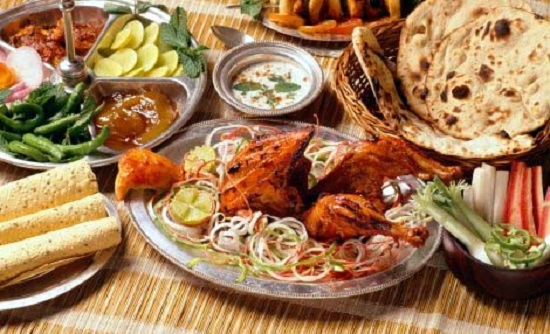
Hippocrates, the father of modern medicine has said, “let food be your medicine; let medicine be your food”. It is true that our food is very important for our health and well being. The function of food is not only just to fill our stomach but to energize our body and in children, to encourage its growth. Inclusion of the proper diet in our body will go a long way in insuring against ill health. Here are ten all-time great foods which should form a part of our diet.
1. Water
 No one can live without water for more than a week but one can live only on water for nearly two months. Water is the most important performance-booster of all. Staying well hydrated helps the body’s chemical reactions work efficiently and keeps temperature under control. Water helps the absorption of the food materials through the intestinal tract. It helps blood circulation and is a detoxifying agent. Dehydration can lead to cramps in muscles, heat exhaustion and stroke. Drinking less water can increase the risk of kidney stones. Adults should drink about 8-10 glasses of water day to keep healthy.
No one can live without water for more than a week but one can live only on water for nearly two months. Water is the most important performance-booster of all. Staying well hydrated helps the body’s chemical reactions work efficiently and keeps temperature under control. Water helps the absorption of the food materials through the intestinal tract. It helps blood circulation and is a detoxifying agent. Dehydration can lead to cramps in muscles, heat exhaustion and stroke. Drinking less water can increase the risk of kidney stones. Adults should drink about 8-10 glasses of water day to keep healthy.
2. Curd (Yoghurt)
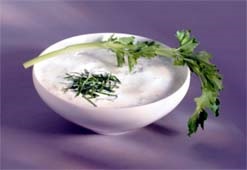 Regarded as a wholesome food since time immemorial curd is basically a lactic fermentation of milk. It helps absorption of all naturally occurring vitamins, proteins and minerals. Being easily digestible it is specially good for young children and elderly people. It is a rich source of calcium and riboflabin. It helps to cleanse our system by binding with harmful toxins and helping them to be excreted from the body. It controls harmful bacteria by increasing the friendly bacteria in the colon. It has many curative and therapeutic uses as well. It is useful in checking diarrhea and also controls constipation. Regular intake of curd is believed to curb premature ageing.
Regarded as a wholesome food since time immemorial curd is basically a lactic fermentation of milk. It helps absorption of all naturally occurring vitamins, proteins and minerals. Being easily digestible it is specially good for young children and elderly people. It is a rich source of calcium and riboflabin. It helps to cleanse our system by binding with harmful toxins and helping them to be excreted from the body. It controls harmful bacteria by increasing the friendly bacteria in the colon. It has many curative and therapeutic uses as well. It is useful in checking diarrhea and also controls constipation. Regular intake of curd is believed to curb premature ageing.
3. Garlic
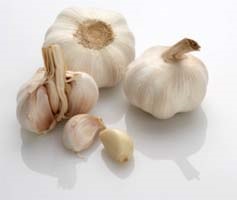 Garlic has been rightly called the terminator of all toxins and a multi faceted herb which has been used since ancient times. It has a number of medicinal properties and is used to treat a variety of illnesses ranging from heart diseases, asthma, intestinal disorders, colitis, diarrhea, dysentery, hypertension etc. Recent research has proved that garlic can also be used to treat cancer. It is a powerful antibiotic and is specially good because it has no harmful side effects. It is regarded as a rejuvenator in blood disorders. Chewing a couple of cloves of garlic every morning is said to impart strength and increase longevity.
Garlic has been rightly called the terminator of all toxins and a multi faceted herb which has been used since ancient times. It has a number of medicinal properties and is used to treat a variety of illnesses ranging from heart diseases, asthma, intestinal disorders, colitis, diarrhea, dysentery, hypertension etc. Recent research has proved that garlic can also be used to treat cancer. It is a powerful antibiotic and is specially good because it has no harmful side effects. It is regarded as a rejuvenator in blood disorders. Chewing a couple of cloves of garlic every morning is said to impart strength and increase longevity.
4. Pulses
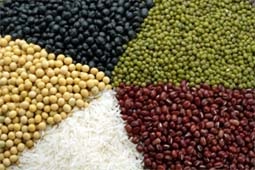 Pulses or legumes are a rich source of protein in our diet. Most Indian meals are incomplete without a “dal”. They are rich sources of energy, protein, minerals and also contain thiamine, riboflabin and niacin. Pulses are highly nutritive, specially in the sprouted form. A combination of cereals and pulses provides an ideal balance of an essential amino acid, making the protein more usable by the body. Vegetarians should include more pulses in their diet.
Pulses or legumes are a rich source of protein in our diet. Most Indian meals are incomplete without a “dal”. They are rich sources of energy, protein, minerals and also contain thiamine, riboflabin and niacin. Pulses are highly nutritive, specially in the sprouted form. A combination of cereals and pulses provides an ideal balance of an essential amino acid, making the protein more usable by the body. Vegetarians should include more pulses in their diet.
5. Beta Carotene
It is making big headlines as the new elixir of life. Beta carotene is a natural pigment found in yellow, orange or deep green vegetables (like carrots and spinach) and in yellow-orange fruits like mangoes and papayas. It is not a vitamin in itself but is a “precursor” of Vitamin A, i.e. the body splits a molecule of beta-carotene to create two molecules of vitamin A. Beta carotene is a part of the body’s defence against the dangerous free radicals and is an anti oxidant. Recent research has proved that beta carotene may also help protect people with coronary heart diseases from heart attacks and strokes. Beta carotene is also found in tomatoes, apricots, raspberries, curry leaves, lettuce, mint leaves etc.
6. Soybean
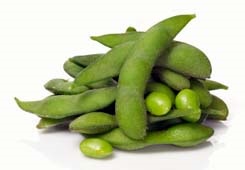 Rightly called the “vegetarian meat”, soybean is regarded as a very nutritive addition to our diet. It is the richest vegetable food known so far. It is a rich source of protein, B complex vitamin, folic acid, iron, calcium and fiber. Being low in carbohydrates and rich in proteins and other nutrients it can be taken by most people. Available as nuggets. flour or granules it can be used innovatively in a number of dishes.
Rightly called the “vegetarian meat”, soybean is regarded as a very nutritive addition to our diet. It is the richest vegetable food known so far. It is a rich source of protein, B complex vitamin, folic acid, iron, calcium and fiber. Being low in carbohydrates and rich in proteins and other nutrients it can be taken by most people. Available as nuggets. flour or granules it can be used innovatively in a number of dishes.
7. Egg
 The white of an egg is full of protein and also contains a fair amount of potassium, riboflavin and iron. It is also cholesterol free and can be eaten by those who are advised a low fat diet. An egg is said to be nature’s own pre packed fast food that takes just about three and a half minutes to prepare. It is one of nature’s most nutritious creations, containing 7g of protein with a mere 75 calories and about 5-6 g of fat. The yolk contains 2-3 mg of cholesterol and should be avoided by people suffering from certain diseases. The yolk also contains two powerful antioxidants – lutein and zeaxanthin – compounds which give it the yellow color. Eggs provides an excellent source of proteins, iron and phosphorus.
The white of an egg is full of protein and also contains a fair amount of potassium, riboflavin and iron. It is also cholesterol free and can be eaten by those who are advised a low fat diet. An egg is said to be nature’s own pre packed fast food that takes just about three and a half minutes to prepare. It is one of nature’s most nutritious creations, containing 7g of protein with a mere 75 calories and about 5-6 g of fat. The yolk contains 2-3 mg of cholesterol and should be avoided by people suffering from certain diseases. The yolk also contains two powerful antioxidants – lutein and zeaxanthin – compounds which give it the yellow color. Eggs provides an excellent source of proteins, iron and phosphorus.
8. Chicken

For non vegetarians chicken is a rich source of protein, riboflavin and iron. A special feature of flesh foods is their content of vitamin B 12 that is absent in plant foods. Chicken extracts and soups prepared from tender meat are very effective for patients convalescing from acute febrile diseases. Chicken is preferred over red meat because of its low fat content.
9. Honey
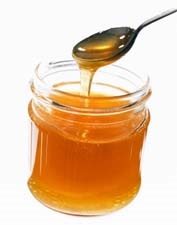 Down the ages honey has been looked upon as the purest of all foods and is considered an exclusive food of the Gods. Known as “shahad” in India honey is one of the most easily digested form of carbohydrates. It is believed to enhance longevity and is used in the preparation of various medicines. As a fuel for the body honey has no equal. As the sugar in honey is pre digested it can be assimilated without taxing the digestive organs. It has a beneficial effect on indigestion, colitis and acidity. It is also recommended for patients of typhoid and pneumonia. A teaspoon of honey taken in lukewarm water to which the juice of half a lemon is added, first thing in the morning, keeps the bowels clear.
Down the ages honey has been looked upon as the purest of all foods and is considered an exclusive food of the Gods. Known as “shahad” in India honey is one of the most easily digested form of carbohydrates. It is believed to enhance longevity and is used in the preparation of various medicines. As a fuel for the body honey has no equal. As the sugar in honey is pre digested it can be assimilated without taxing the digestive organs. It has a beneficial effect on indigestion, colitis and acidity. It is also recommended for patients of typhoid and pneumonia. A teaspoon of honey taken in lukewarm water to which the juice of half a lemon is added, first thing in the morning, keeps the bowels clear.
10. Nuts

Right from ancient times nuts have been an integral part of man’s diet. Rich in proteins, oils, fats and vitamins, nuts are a storehouse of nutrition. Nuts are concentrated sources of food energy and micro nutrients. Recent research has indicated that nuts are good for the heart, contrary to popular belief. Most nuts are rich in arginine, an essential amino acid which helps to dilate blood vessels.
Thus to maintain a healthy lifestyle, proper attention should be given to one’s diet. Inclusion of the above constituents in our diet will go a long way to ensure good health.
Images (c) gettyimages.com
26-Oct-2019
More by : Dr. Anjana Maitra

|
Good summary. I am however surprised by the absence of milk and fish. |